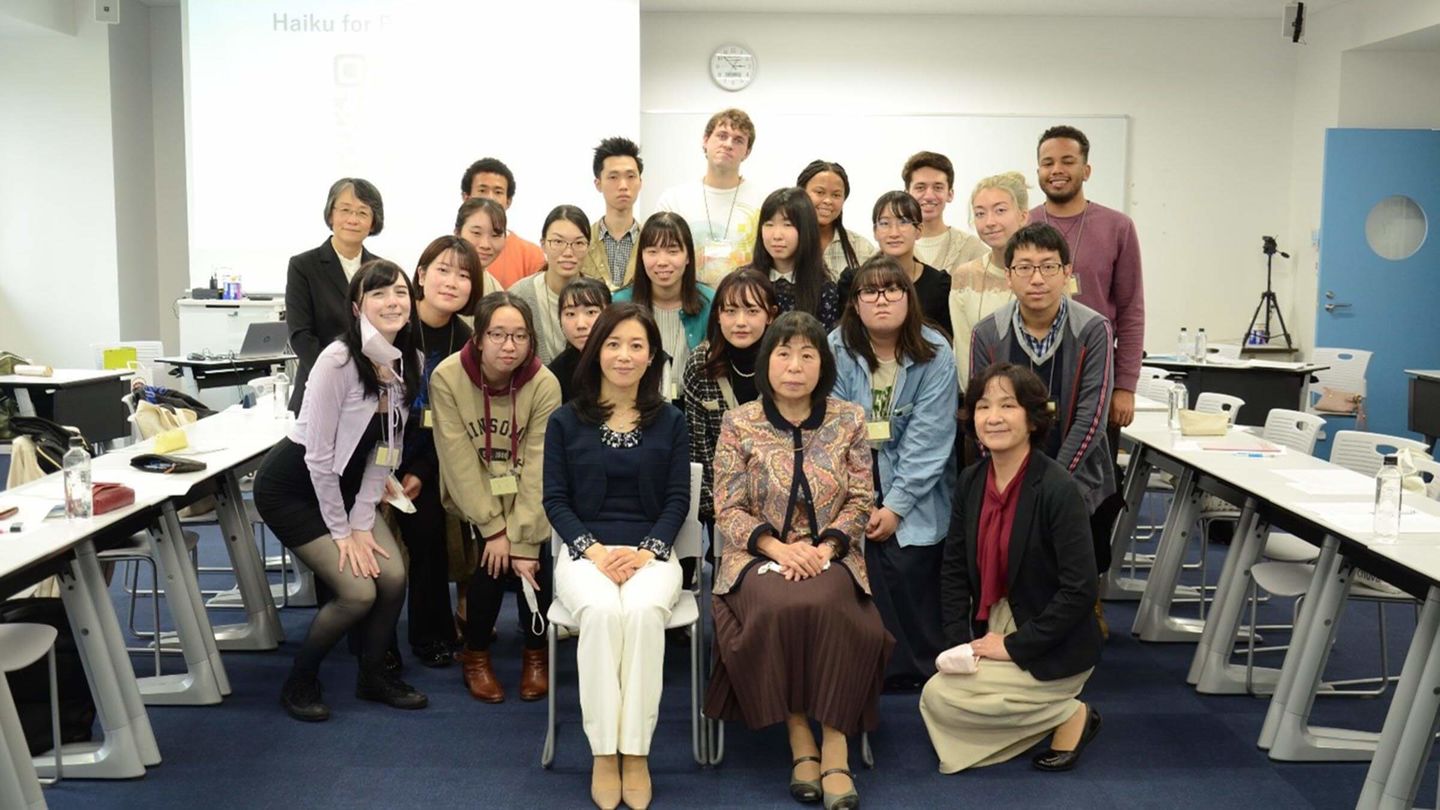TUJ and SWU students and faculty gather for a group photo after kukai
Students of the Japanese Language Program at Temple University, Japan Campus (TUJ) participated in a joint haiku poetry event with students at Showa Women’s University (SWU) on October 22, 2022. TUJ students composed haiku poems on the theme of peace, allowing them to deepen their understanding of the Japanese language and culture.
The event was held in kukai style, which is a casual form of poetry contest. Students at both universities were assigned to write a haiku on the topic before the event. Each student voted for their favorite poems after hearing them read aloud during kukai. Madoka Mayuzumi, an acclaimed haiku poet and a visiting professor of SWU’s Department of Japanese Language and Literature, was one of the critics, who reviewed their work and provided tips on improving their haiku.
TUJ students noted in a survey after the event that they found it useful to understand the nature of haiku and to expand their Japanese vocabulary. They said that sharing their work at the event played an important role in deepening friendships between both schools.
Robert Kirchner, a TUJ senior majoring in Japanese language, said that he had a great experience meeting and making new friends at SWU. Kircher, who is from New Jersey, initially found it difficult to follow since the haiku event was held mostly in native-level Japanese. Still, he said this was an important opportunity to improve his language ability. “Listening to a variety of haiku was a privilege for me,” Kirchner said. “I hope more people will be interested in haiku because it makes you appreciate your life every day in a new way.”
Kirchner’s haiku “戦だぞ 紅葉が舞い 鬼ごっこ(It’s a war, the autumn leaves are dancing, it’s a game of tag)” received a special award from Professor Mayuzumi at the event. “I was very surprised that she selected my haiku out of the others which were all very nice,” he said. “Three years ago, I had a professor who encouraged me to practice writing haiku on my own, so now to be selected in this way was actually very emotional for me. I spoke with Mayuzumi afterward, and she also encouraged me to continue writing which I am intending to do.”
Max Sanchez, who is studying at TUJ in the fall semester as an exchange student from a university in California, said the event was meaningful for him to learn about the impact of haiku on Japanese culture.
Sanchez’s poem 初紅葉 静かな林 神の息(First red leaves Quiet forest God’s breath)drew many votes from the participating students. He based the haiku on his experience when he moved to Japan in late August. “I would often take walks around the residential area of Suginami-ku, noticing the quiet neighborhoods that were surrounded by green trees,” Sanchez said. “Where I am from back in California, there is not a lot of greenery, so seeing how much nature was prevalent even within Tokyo neighborhoods surprised me. I wrote my haiku intending to create a piece that incorporated elements of traditional poetry, such as including rhymes, as well as nature.”
Asako Yamaguchi, assistant professor of Japanese and critical languages at TUJ, said the idea of holding kukai came up three years ago. But back then, she thought it would be difficult for TUJ students to take part in kukai. “This time, I have made haiku as a part of my writing class, so students had a chance to learn the basics to compose haiku poems of their own in class,” she said. “With the help of SWU professors and through hard work by our students, we were able to hold the event.”
Assistant Professor Yamaguchi said that she received positive feedback from the faculty and staff of SWU. She said they were impressed by the quality of haiku poems by TUJ students, even though they were non-Japanese native speakers. “I was delighted to receive positive feedback, but it probably gave the students a lot of confidence, which was very important for them,” Yamaguchi said.
Other related stories
- India Diplomat Delivers Lecture to TUJ Students of Politics of the Global Economy Course (October 18, 2022)
- Students Attend Exclusive Lectures by Diplomats of Ukraine and Lithuania as Geopolitical Tensions Intensified (May 9, 2022)

